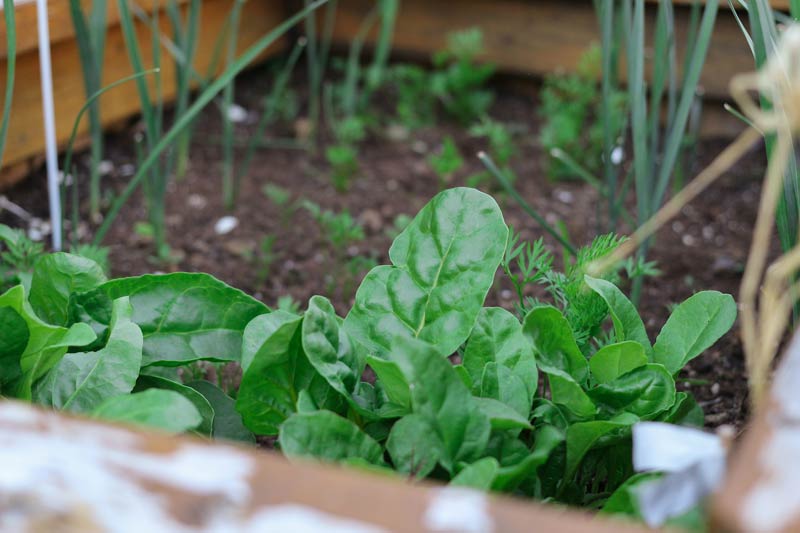FDIC-Insured - Backed by the full faith and credit of the U.S. Government
-
-

-
Kristen Peterson
Omaha NativeMay 06 2021
-

Spice up Your Life—Start an Herb Garden this Year
If you are a cook—daring or timid—there is no doubt, you’ve come across a recipe that calls for fresh herbs. It could be as simple as cilantro or something more difficult to find, like tarragon or thyme. Wouldn’t it be nice to have the flavors you fancy right at your fingertips? You can, simply by planting your own herb garden!
Herb gardens are easy to grow and add flavor to your table. They also contribute to a more robust environment by increasing your landscape’s biodiversity and offering pollinator habitats for bees and butterflies.
Culinary magic? Happy insects? What are you waiting for? Get started by using the following tips and soon, you’ll be nibbling on your very own home-grown herbs.
How to Start Your Own Herb Garden
One of the biggest advantages to growing an herb garden is that plants can be started anytime and grown in the smallest of spaces, including windowsill containers. This flexibility and portability make it possible to keep your garden growing indoors, adding spice to your life, all year long.
If the plan is to move your garden outdoors during growing season, you can start seeds or cuttings inside to get a head start. Once the weather warms, move your plants outside to liven up your landscape or keep them in pots to dress up your patio.
No matter where your garden grows, it’s important to choose herb starts that are from healthy, disease- and bug-free stock. You’ll also be looking for plants that exhibit good growth and color and varieties that align with your culinary adventures.
Carefully consider your space and check plant labels before purchasing. Pay close attention to how much sun an herb requires. Understand which plants grow aggressively and those that come back year after year (perennial). Sometimes, an enthusiastic herb gardener will unknowingly plant an aggressive perennial, such as mint, for a single season only to discover that it takes over the garden the following year.
If you’re looking for inspiration when choosing herbs for your garden, you don’t have to be too fussy about which plants grow well together because they all live in harmony. You could choose a theme that’s tasty, practical, fragrant, or a combination! Here are a few, fun garden ideas:
The Everyday Essential Garden:
Combine basil, cilantro, chive, lavender, oregano, parsley, rosemary, and thyme into your garden, and you’ll have the tried-and-true standard seasonings on hand for cooking.
The Tea Garden:
Anise hyssop, bee balm, borage, calendula, chamomile, echinacea, elderberry, lavender, lemon balm, lemon verbena, mint, and stevia will make flavorful additions to your morning (or anytime) cup of tea.
The Vinegar and Oil Garden:
Chives, dill, fennel, French tarragon, garlic, lemon verbena, mustards, oregano, parsley, purple basil, and rosemary are all perfect additions to oil and vinegar-based salad dressings.
The Evening Cocktail Garden:
Bringing up basil, borage, elderberry, fennel, lavender, lemon balm, mint, sage, and stevia can provide some zing to your evening libations.
The Fragrant Garden:
Lavender, lemon verbena, mint, rosemary, sagebrush, scented geranium will add fragrance to your landscape throughout the summer months.
The Bursting-with-Flavor Salad Garden:
Combine amaranth, arugula, chives, chervil, mustards, nasturtium, salad burnet, and sorrel in your herb garden and you’ll be ready to toss a tasty salad at a moment’s notice.
Final Tips on Planting an Herb Garden
Herbs are a great way to add spice to your garden and dinner plate, but to get the most from your efforts, make sure you’re aware of each plant’s growth habits and standards of care. Full sun and well-drained soil are a must for most and don’t forget to water.
You will also want to take regular cuttings to keep your herb garden productive with new vegetative growth. This is especially important for the annual herbs like basil.
If you find yourself overrun with herbs you can’t use, consider drying them or propagating cuttings for next season. Many herbs, such as oregano, thyme, rosemary, and lemon balm can be rooted from cuttings or divided and replanted to expand your garden.
To protect garden space from the more aggressive herbs, like mint, you can “sink a pot.” This method provides a barrier that can slow its unwanted spread. In general, containers are a great option for herb gardening. Just make sure there are holes in the bottom for adequate drainage.
Fresh herbs are an excellent way to bring beauty and diversity to your landscape and dress up any dish. So, make the bees and your friends or family a little happier, grow an herb garden this year!
About the Author
Kristen Peterson is an Omaha native. She is passionate about fresh, sustainable food. She has a degree in Horticulture from UNL and has 20 years of industry experience, working retail at local nurseries, as groundskeeper at University Landscape Services, and grower at Bluebird Nursery. Kristen wears many hats at Lauritzen Gardens and is currently a Horticulture Manager, overseeing the Children’s, Japanese, Herb, Founders, and Conservation Discovery Gardens as well as the natural areas that spread across the garden’s 100 acres. She is an outdoor enthusiast; along with gardening she enjoys cooking, biking, hiking, canoeing, and camping with her husband, 4-year-old son, infant daughter, and Humane Society sidekick.
She is excited to share her expertise with YOU!
The articles in this blog are for informational purposes only and not intended to provide specific advice or recommendations. When making decisions about your financial situation, consult a financial professional for advice. Articles are not regularly updated, and information may become outdated.